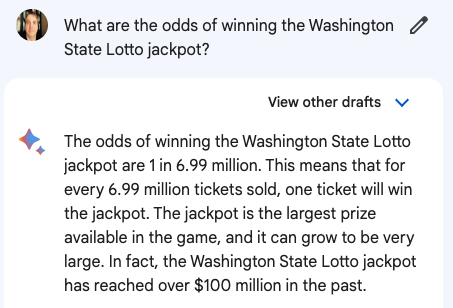Bard on Lotto
I asked Google Bard, “What are the odds of winning the Washington State Lotto jackpot?” Its reply began with two sentences:

- The odds of winning the Washington State Lotto jackpot are 1 in 6.99 million.
- This means that for every 6.99 million tickets sold, one ticket will win the jackpot.
#1 is correct and a useful parsing of information from the Lotto website. #2 is either false or misleading, depending on how you read it.
The WA Lotto is a 6-of-49 number picking game. The game will pick six numbers from 1 to 49 without replacement (no repeats) in any order, and you have to guess in advance which numbers will be picked. If you guess all six numbers, you win the jackpot. The odds of winning the jackpot in a single pick are 1 in 49!/(6! * 43!) = 13,983,816. You get two picks per $1 ticket, so the odds that a ticket will win the jackpot are 1 in 6.99 mil.
$$\frac{n!}{r!(n-r)!} = \frac{49!}{6! \times 43!} = 13983816$$
To guarantee a jackpot win for a single lottery, you can buy $7 mil worth of tickets and pick every of the 13,983,816 possible combinations. But that’s not what Bard said. Statement #2 suggests that 13.98 mil random picks (as if 6.99 mil people bought a $1 ticket) would guarantee a jackpot win. This is false.
What are the chances that given 13.98 mil random picks, at least one of them will win the jackpot? One way to figure this is to calculate the odds of each possible win pattern: pick #1 wins and all the others lose, pick #2 wins and all other lose, pick #1 and pick #2 both win, etc. Then add them up. But there’s an easier way.
Given that either an event happens or it doesn’t happen, the odds of the event not happening is 1 minus the odds of it happening, because the total odds of all possibilities must add to 1. It is guaranteed (probability 1) that the odds that the coin will land either heads (1/2) or tails (1/2): $1/2 + 1/2 = 1$. If the odds that one pick gets the jackpot is $P(M) = $ 1 in 13,983,816, the odds that one pick doesn’t get the jackpot is $1 - P(M)$.
$$1 - P(M) = 1 - \frac{1}{13983816} = \frac{13983815}{13983816}$$
To determine the odds of at least one of multiple picks winning the lottery, we consider its opposite: what are the odds that nobody wins the jackpot? If the odds of one pick not matching are $1 - P(M)$, then the odds of all 13,983,816 random picks not matching are $1 - P(M)$ multiplied by itself 13,983,816 times.
$$(1 - P(M))^t = (1 - \frac{1}{13983816})^{13983816}$$
So the odds of at least one pick out of 13.9 million picks matching are 1 minus this number, or about 63%. It’s likely, but not “guaranteed.”
$$1 - (1 - \frac{1}{13983816})^{13983816} = 0.63212057175$$

It’s always amusing to me to realize that this accounts for all of the possibilities of which picks are winners, including the possibility that everyone picked exactly the same numbers and they matched, or everyone won but you, etc. Importantly, these are the total odds of somebody out of millions of people winning, not the odds of you winning.
Chatbots being wrong isn’t news. What I think is interesting here is that chatbots seem to be wrong about mathematics more often than with other subjects. Chatbots don’t understand anything. They’re guessing at how someone might answer a question based on the text of billions of people discussing billions of things. This makes chatbots more likely to repeat common misconceptions when those misconceptions appear more often than their corrections in the training data.